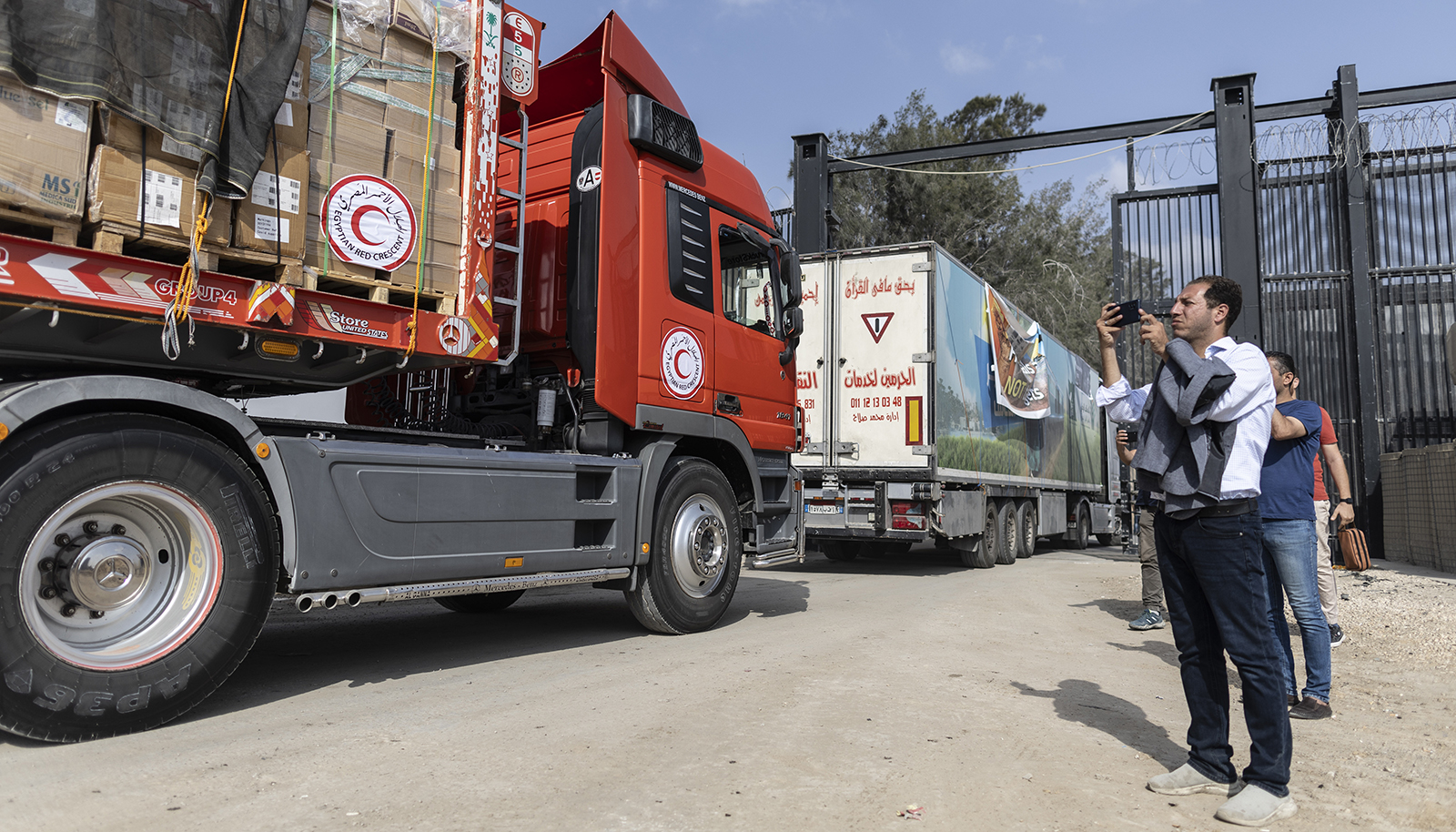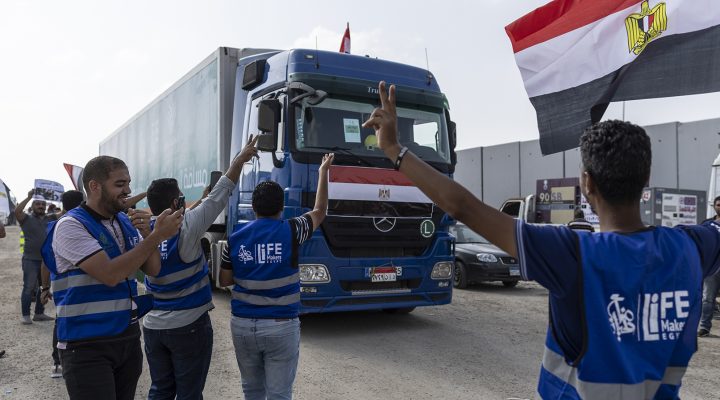Why did it take so long for the border crossing from Egypt into Gaza to be reopened so that relief supplies could enter for the benefit of 2 million people living without water, electricity or fuel?
The Rafah Crossing has a tempestuous role in modern Middle East history. Although controlled by Egypt, the road had been bombed by Israeli forces in that nation’s current response to the Hamas surprise attack of Oct. 7. That’s the official reason cited for a delay in reopening the crossing for aid convoys.

Stephen Chan
But there’s likely another reason, according to Stephen Chan, professor of world politics at the School of Oriental and African Studies, University of London. In an interview with BNG, Chan noted some members of Hamas are believed to have ties to the Muslim Brotherhood, a radical political movement in Egypt.
According to the Council on Foreign Relations, Hamas was founded in 1987 by Sheikh Ahmed Yassin, a Palestinian cleric who became an activist in local branches of the Muslim Brotherhood after dedicating his early life to Islamic scholarship in Cairo. Beginning in the late 1960s, Yassin preached and performed charitable work in the West Bank and Gaza, both of which Israel occupied after the 1967 Six-Day War (against Arab countries of Egypt, Syria and Jordan).
“Egypt has always regarded Hamas as closely related to the Muslim Brotherhood,” Chan said. “Thus, the Egyptian border with Gaza is normally sealed off in order to dissuade close contact between the two organizations.”
He added: “For the reason of preventing Hamas/Brotherhood face-to-face communication, Egypt has been very slow delivering aid to Gaza. Thus far, politics on all sides have prevented aid entering in any appreciable amount. Water and medicine may be far more important than food, and the Gaza hospitals are perilously short on both. The U.N. is powerless to increase the pace of aid.”
Whatever anyone thinks of Hamas’ association with the Muslim Brotherhood, Chan said Hamas does not need assistance from the Muslim Brotherhood. “Hamas fighters do not depend on Brotherhood help with their training and armament. They have many sources of help, some from Iran — despite the Sunni and Shi’a divide between the two,” he explained, while warning of a potential conflict escalation if reason doesn’t prevail.
“Egypt has always regarded Hamas as closely related to the Muslim Brotherhood.”
“Israel has now bombed a mosque in Jenin, on the West Bank territory of non-Hamas Palestine. It is almost as if Israel is inviting a third front — the second being if Hezbollah attacks in force from the north. There have been flashpoints already in the north. So it is eminently possible that a wider war will ensue.
“The strategy may be to stretch Israeli forces thin. But no side has an endgame. Israel doesn’t know what to do with Gaza should some sort of victory be declared. Hezbollah doesn’t want to rule any part of Israel either. And the Israelis refuse to allow a two-state solution which would see formal independence and sovereignty for the West Bank Palestinians. For sovereignty means control over one’s own land, and Israel remains very hungry for more land.”
He added, “Even if the war does not greatly escalate, hatred, tension and sporadic violence will continue for many years. Slaughter begets slaughter. It doesn’t matter who started it. The challenge of history is who will step up to stop it.”
For now, the focus remains on getting desperately needed aid across the border from Egypt into Gaza.
To date, more than 5,000 people have been killed in Gaza due to the fighting, with women and children accounting for 62% of fatalities, according to the United Nations. Another 1,400 people have been killed in Israel, most on the opening day of the Hamas attack. Thousands more are wounded on both sides, and Hamas still holds an unknown number of hostages taken from Israel.
Further, according to the U.N., “nearly 600,000 internally displaced are sheltering in 150 UNRWA facilities overall with nearly 420,000 seeking refuge in 93 of the agency’s shelters” in Gaza.
Another 1,000 people are reported missing and “are presumed to be trapped or dead under the rubble” in Gaza, the U.N. added.

The second convoy of aid trucks cross the Rafah border from the Egyptian side on October 22, 2023 in North Sinai, Egypt. The aid convoy, organized by a group of Egyptian NGOs, set off Saturday, October 14, from Cairo for the Gaza-Egypt border crossing at Rafah. A week of tortuous negotiations followed about when the border, controlled by Egypt on one side and Hamas on the other, would be opened, until the first trucks were admitted on October 21. (Photo by Mahmoud Khaled/Getty Images)
After days of delay, relief trucks are now trickling through the Rafah Crossing. U.N. officials estimate 100 trucks would be needed every day to meet the level of need, but to date a total of only 80 have crossed.
Over the weekend, “thousands of people broke into several UNRWA warehouses and distribution centers in the middle and southern areas of the Gaza Strip, taking wheat flour and other basic survival items like hygiene supplies,” the U.N. reported. “One of the warehouses, in Deir al-Balah, is where UNRWA stores supplies from the humanitarian convoys coming from Egypt.”
Thomas White, director of UNRWA affairs in the Gaza Strip, said the situation is dire.
“This is a worrying sign that civil order is starting to break down after three weeks of war and a tight siege on Gaza.”
“This is a worrying sign that civil order is starting to break down after three weeks of war and a tight siege on Gaza,” he said. “People are scared, frustrated and desperate. Tensions and fear are made worse by the cuts in the phones and internet communication lines. They feel that they are on their own, cut off from their families inside Gaza and the rest of the world.
“Supplies on the market are running out while the humanitarian aid coming into the Gaza Strip on trucks from Egypt is insufficient. The needs of the communities are immense, if only for basic survival, while the aid we receive is meager and inconsistent.”
Others in the region have joined the U.N. in warning of a large-scale humanitarian disaster unfolding.
The African Union Commission, in a joint statement with the Arab League, appealed to those involved in the war to give peace a chance.
“Both organizations express grave concern over the Israeli order for more than 1 million Palestinians to leave their homes, contrary to international law. Therefore, they call on the United Nations and the international community to stop a catastrophe unfolding in front of us, before it is too late,” the statement says, stressing “the pressing need to avoid escalation, underscoring that an Israeli invasion would undoubtedly entail a huge number of civilian casualties, including women and children, which could lead to a genocide of unprecedented proportions.”
A report by the International Crisis Group also called for peace, noting the consequences of seeing no other end to the conflict than through the use of arms and force will be calamitous.
“With Hamas’ attacks, Israel suffered a calamity on Oct. 7, shattering its sense of security. Its right to self-defense and to secure Israeli communities in the south is clear. But if its response continues along the present course, Israel will not only raze Gaza, home to 2.3 million people, but risk igniting a regional conflagration that would pose a far graver danger to Israel itself.”
Anthony Akaeze is a Nigerian-born freelance journalist who lives in Houston. He covers Africa for BNG.
Related articles:
A Christian response to the war in Israel/Palestine | Opinion by Brandan Robertson
On building walls | Opinion by Grace Ji-Sun Kim
Maybe there are some ‘good guys’ in this war after all | Opinion by Mark Wingfield


